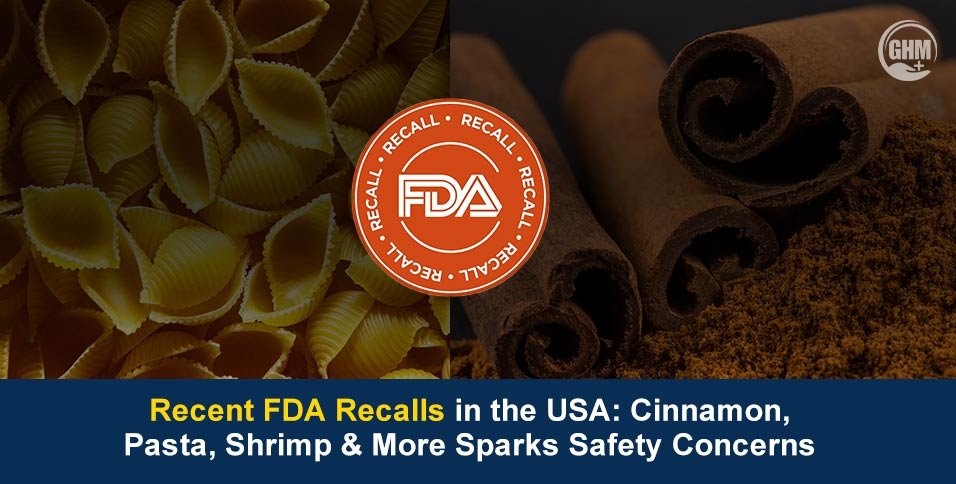The recent FDA Recalls in the U.S. have raised significant concerns among consumers, health experts, and food industry leaders. From cinnamon containing elevated lead levels to frozen shrimp contaminated with radioactive cesium, the range and seriousness of these recalls highlight a growing need for vigilant food safety measures.
In the past few weeks, the U.S. Food and Drug Administration (FDA) has issued multiple public health alerts and product recalls involving common food items like ground cinnamon, ready-to-eat pasta, frozen shrimp, fruit cocktails, and rice bowls.
Each case involves a unique contamination risk, from heavy metals to bacterial infections and radioactive substances.
Why These Recalls Matter
The recent food recalls are not just industry warnings, they are public health protections.
Contaminated or unsafe food can lead to serious health problems, including lead poisoning, listeriosis, foodborne infections, or long-term exposure to harmful substances.
“Recalls are a key part of our food safety system. They’re not just red flags, they’re shields to protect consumers from dangerous exposures,” explains Dr Emily Carter, a food safety researcher.
The Recent FDA Recalls in the USA:
1. Cinnamon Recall
Product Involved: Ground Cinnamon (multiple brands)
Reason: Elevated lead levels detected
Health Risk: Lead exposure can be dangerous particularly for children, potentially affecting brain development and the nervous system.
- The FDA expanded its public health alert in October 2025 to include more ground cinnamon products.
- Products were sold at major retail stores across the U.S..
- Consumers are advised to check labels carefully and avoid affected batches.
Lead exposure can accumulate over time. Even small amounts can pose risks, making this recall especially serious for households with children.
2. Prepared Pasta Meals Recall
Product Involved: Frozen and ready-to-eat pasta meals
Reason: Potential contamination with Listeria monocytogenes
Health Risk: Listeriosis, a serious infection that can be life-threatening for pregnant women, newborns, older adults, and people with weakened immune systems.
- The recall was issued nationwide.
- Listeria can survive refrigeration, making frozen and pre-cooked products a particular concern.
- No illnesses have been reported yet, but the FDA urges consumers to discard recalled items immediately.
Listeria infections can lead to severe complications, including miscarriage, meningitis, and bloodstream infections. This Listeria outbreak highlights the need for these recent FDA recalls.
3. Frozen Shrimp Recall
Product Involved: Frozen shrimp products imported from PT Bahari Makmur Sejati
Reason: Contamination with Cesium-137, a radioactive substance
Health Risk: Prolonged exposure to Caesium-137 can increase cancer risk and affect multiple organs.
- Cesium-137 is typically linked to nuclear contamination.
- The recall affects several U.S. states where these products were distributed.
- Consumers are urged to check origin labels and discard any affected shrimp immediately.
This is a rare type of contamination, signalling the importance of strict import inspection and supply chain monitoring.
4. Fruit Cocktail Recall
Product Involved: Canned fruit cocktails
Reason: Potential contamination leading to an FDA risk warning
Health Risk: While the exact contaminant was not initially disclosed, consumption of contaminated canned goods can lead to foodborne illness and gastrointestinal infections.
- Distributed across 27 U.S. states.
- Consumers are urged to avoid products from the recalled batches and return them to the place of purchase.
- This recall highlights vulnerabilities in the processed fruit supply chain.
Fruit cocktails are widely consumed, especially in schools and institutions, increasing potential exposure.
5. Rice Bowl Recall
Product Involved: Packaged rice bowl meals
Reason: Contamination risk (details under FDA investigation)
Health Risk: Depending on the contaminant, risks can range from mild foodborne illness to more severe outcomes in vulnerable individuals.
- The recall spans nine states.
- FDA is conducting further testing to determine the contamination source.
- Consumers are advised not to consume the product and follow official recall instructions.
Ready-to-eat meals are growing in popularity, making strict safety checks and recent FDA recalls crucial for mass-distributed convenience foods.
Why Are FDA Recalls Increasing
1. Tighter Testing and Surveillance
Modern technology helps to detect contamination earlier and more accurately. This leads to more frequent recalls, but also better consumer protection.
2. Global Supply Chain Risks
Many products are imported or processed overseas, where safety standards may differ. This increases the complexity of monitoring contamination.
3. Climate and Storage Factors
Heat waves, shipping delays, and poor storage can accelerate bacterial growth and chemical degradation in food products.
4. Increased Public Awareness
More transparent FDA reporting and online databases allow recalls to reach the public faster than ever before.
What Consumers Should Do
- Check the FDA’s official recall list regularly.
- Inspect product labels for batch numbers and origins.
- Discard or return recalled products immediately.
- Monitor health symptoms if contaminated products may have been consumed.
- Report suspected illness to local health departments or the FDA.
Conclusion
The recent FDA recalls, including cinnamon, pasta, shrimp, fruit cocktails, and rice bowls are underlining a broader trend.
Food contamination risks are diversifying, and regulatory bodies are stepping up surveillance. While recalls can be alarming, they also reflect a robust safety net working to protect the public.
Food recalls are never good news, but they are a critical part of protecting public health. By staying informed, checking products carefully, and following official alerts, consumers can reduce their risk and help ensure a safer food system.













